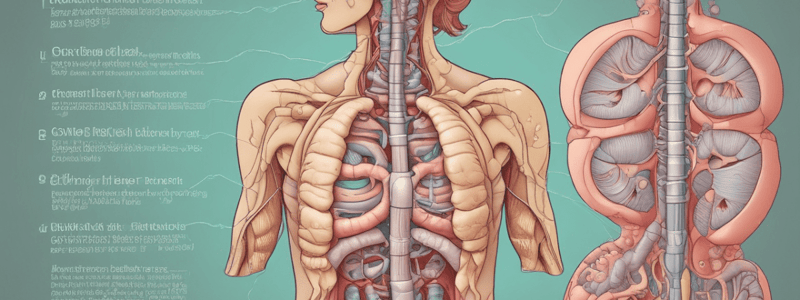Podcast
Questions and Answers
What is the most common symptom of gastritis?
What is the most common symptom of gastritis?
- Abdominal pain (correct)
- Dysphagia
- Heartburn
- Diarrhea
Which of the following is NOT a cause of esophagitis?
Which of the following is NOT a cause of esophagitis?
- Infections
- GERD
- H. pylori infection (correct)
- Pill esophagitis
What is the primary cause of gastroesophageal reflux disease (GERD)?
What is the primary cause of gastroesophageal reflux disease (GERD)?
- Incompetent lower esophageal sphincter (LES)
- Hiatus hernia
- Obesity
- All of the above (correct)
What is the primary method of transmission of H. pylori infection?
What is the primary method of transmission of H. pylori infection?
What is the most common ulcer location in Peptic Ulcer Disease (PUD)?
What is the most common ulcer location in Peptic Ulcer Disease (PUD)?
Which of the following is a diagnostic test for H. pylori infection?
Which of the following is a diagnostic test for H. pylori infection?
Flashcards are hidden until you start studying
Study Notes
Gastritis
- Inflammation of the gastric mucosa
- Causes:
- Infection (H. pylori, viruses, bacteria)
- Autoimmune disorders
- Irritants (alcohol, NSAIDs, aspirin)
- Physical stress
- Types:
- Acute gastritis: sudden, self-limiting
- Chronic gastritis: persistent, may lead to atrophy and metaplasia
- Symptoms:
- Abdominal pain
- Nausea and vomiting
- Loss of appetite
- Weight loss
- Diagnosis:
- Endoscopy with biopsy
- Urea breath test (H. pylori)
Esophagitis
- Inflammation of the esophageal mucosa
- Causes:
- GERD
- Infections (Candida, herpes)
- Radiation therapy
- Pill esophagitis
- Symptoms:
- Dysphagia
- Odynophagia
- Chest pain
- Heartburn
- Diagnosis:
- Endoscopy with biopsy
- Barium swallow
Gastroesophageal Reflux (GERD)
- Backflow of stomach contents into the esophagus
- Causes:
- Incompetent lower esophageal sphincter (LES)
- Hiatus hernia
- Obesity
- Pregnancy
- Symptoms:
- Heartburn
- Regurgitation
- Dysphagia
- Chest pain
- Diagnosis:
- Endoscopy with biopsy
- Ambulatory acid probe
- Esophageal manometry
Helicobacter Pylori Infection
- Bacterial infection of the gastric mucosa
- Causes:
- Ingestion of contaminated food and water
- Person-to-person transmission
- Symptoms:
- Asymptomatic (most cases)
- Gastritis
- Peptic ulcer disease
- Diagnosis:
- Urea breath test
- Stool antigen test
- Endoscopy with biopsy
- Treatment:
- Antibiotics
- PPIs
- Bismuth-containing compounds
Peptic Ulcer Disease (PUD)
- Ulcers in the stomach (gastric ulcer) or duodenum (duodenal ulcer)
- Causes:
- H. pylori infection
- NSAID use
- Stress
- Symptoms:
- Epigastric pain
- Nausea and vomiting
- Melena (black tarry stools)
- Hematemesis (vomiting blood)
- Diagnosis:
- Endoscopy with biopsy
- Upper GI series with barium
- Treatment:
- Antibiotics (H. pylori eradication)
- PPIs
- H2 blockers
- Avoidance of NSAIDs
Gastritis
- Inflammation of the gastric mucosa causes abdominal pain, nausea, vomiting, loss of appetite, and weight loss.
- Causes of gastritis include infection (H. pylori, viruses, bacteria), autoimmune disorders, irritants (alcohol, NSAIDs, aspirin), and physical stress.
- There are two types of gastritis: acute gastritis, which is sudden and self-limiting, and chronic gastritis, which is persistent and may lead to atrophy and metaplasia.
- Diagnosis is made through endoscopy with biopsy and urea breath test (for H. pylori).
Esophagitis
- Inflammation of the esophageal mucosa causes dysphagia, odynophagia, chest pain, and heartburn.
- Causes of esophagitis include GERD, infections (Candida, herpes), radiation therapy, and pill esophagitis.
- Diagnosis is made through endoscopy with biopsy and barium swallow.
Gastroesophageal Reflux (GERD)
- Backflow of stomach contents into the esophagus causes heartburn, regurgitation, dysphagia, and chest pain.
- Causes of GERD include incompetent lower esophageal sphincter (LES), hiatus hernia, obesity, and pregnancy.
- Diagnosis is made through endoscopy with biopsy, ambulatory acid probe, and esophageal manometry.
Helicobacter Pylori Infection
- Bacterial infection of the gastric mucosa causes gastritis and peptic ulcer disease.
- Causes of H. pylori infection include ingestion of contaminated food and water and person-to-person transmission.
- Symptoms of H. pylori infection are often asymptomatic, but can include gastritis and peptic ulcer disease.
- Diagnosis is made through urea breath test, stool antigen test, and endoscopy with biopsy.
- Treatment includes antibiotics, PPIs, and bismuth-containing compounds.
Peptic Ulcer Disease (PUD)
- Ulcers in the stomach (gastric ulcer) or duodenum (duodenal ulcer) cause epigastric pain, nausea, vomiting, melena (black tarry stools), and hematemesis (vomiting blood).
- Causes of PUD include H. pylori infection, NSAID use, and stress.
- Diagnosis is made through endoscopy with biopsy and upper GI series with barium.
- Treatment includes antibiotics (H. pylori eradication), PPIs, H2 blockers, and avoidance of NSAIDs.
Studying That Suits You
Use AI to generate personalized quizzes and flashcards to suit your learning preferences.



